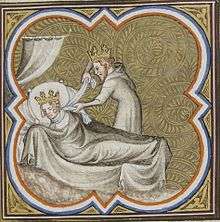Galswintha
| Galswintha | |
|---|---|
| Queen consort of Neustria (Soissons) | |
 The strangling of Galswintha by Chilperic I | |
| Born | 540 |
| Died | 568 (aged 27–28) |
| Spouse | Chilperic I |
| Father | Athanagild |
| Mother | Goiswintha |
| Religion | Arianism– |
Galswintha (540–568) was a queen consort of Neustria. She was the daughter of Athanagild, Visigothic king of Hispania (the Iberian Peninsula, comprising modern Spain and Portugal), and Goiswintha. Galswintha was the sister of Brunhilda, Queen of Austrasia; and the wife of Chilperic I, the Merovingian king of Neustria. Galswintha was murdered at the urging of Chilperic's former wife, Fredegund, instigating a 40 year civil war within the Merovingian kingdom.
History
Merovingian king, Chilperic I (561–584), sought Galswintha's hand in marriage after his brother, King Sigebert, had married the noblewoman, Brunhilda (Galswintha's sister), a union that violated the Merovingian tradition of seeking the hand of a lowborn woman instead.[1] According to Gregory of Tours, Chilperic was betrothed to multiple women at the time of his marriage to Galswintha and had promised to dismiss all of them if she accepted his proposal, which she did and Chilperic honored his avowal by dispensing with his other wives.[2] Immediately after marrying Galswintha sometime between 556–557, Chilperic gave to her the cities of Limoges, Bordeaux, Cahors, Bearn, and Bigorre as a gift.[3] Chilperic supposedly loved her "dearly" due to her substantial dowry.[4] His former wife Fredegund continued to visit the king's bedchamber, despite Chilperic's proclaimed commitment to Galswintha. She complained bitterly about this betrayal.[2] Still in love with Fredegund, Chilperic allowed himself to be manipulated and had his wealthy wife murdered.[5] Galswintha was apparently strangled.[2] After Galswintha's death, however, the lands—formerly given by Chilperic—passed to her sister Brunhilda.[6]
Even though Chilperic retained Galswintha's dowry, her untimely death aroused the enmity of her sister Brunhilda against him and Fredegund; it also incurred the wrath of his brother Sigebert, bringing about 40 years of conflict between the Frankish kingdoms of Austrasia and Neustria—a veritable Merovingian civil war.[7] When Chilperic was murdered in 584,[8] Brunhilda's anger remained unassuaged, and the conflict following Galswintha's murder continued until Fredegund's death in 597.[9]
Galswintha remains listed in modern genealogical charts demonstrating the links between the Visigothic kingdoms and the Byzantine Empire.[10]
Commemoration in Verse
The Late Latin poet Venantius Fortunatus wrote a long commemorative poem (Carmina VI.5) in honour of Galswintha.[lower-alpha 1]
In popular culture
Symphonic metal band Leaves' Eyes also wrote a song from their album Symphonies of the Night titled "Galswintha".
References
Notes
- ↑ English translation by Judith George, in Venantius Fortunatus: Personal & Political Poems (Liverpool: Translated Texts for Historians, 1995), pp.40–50.
Citations
- ↑ Frassetto 2003, p. 176.
- 1 2 3 Bauer 2010, p. 247.
- ↑ McNamara & Wemple 1973, pp. 129–130.
- ↑ Gregory of Tours 1974, p. 222.
- ↑ Frassetto 2003, pp. 176–177.
- ↑ McNamara & Wemple 1973, p. 130.
- ↑ Frassetto 2003, p. 177.
- ↑ Bauer 2010, p. 248.
- ↑ Frassetto 2003, pp. 119–120.
- ↑ Goffart 1957, p. 83.
Biblioigraphy
- Bauer, Susan Wise (2010). The History of the Medieval World: From the Conversion of Constantine to the First Crusade. New York: W. W. Norton & Company. ISBN 978-0-39305-975-5.
- Frassetto, Michael (2003). Encyclopedia of Barbarian Europe: Society in Transformation. Santa Barbara, CA: ABC-CLIO. ISBN 978-1-57607-263-9.
- Goffart, Walter (1957). "Byzantine Policy in the West under Tiberius II and Maurice: The Pretenders Hermenegild and Gundovald". Traditio. 13 (1): 73–118. JSTOR 27830344.
- Gregory of Tours (1974). The History of the Franks. Harmondsworth, UK: Penguin. ISBN 978-0-14044-295-3.
- McNamara, Jo Ann; Wemple, Suzanne (1973). "The Power of Women through the Family in Medieval Europe: 500–1100". Women's History. 1 (3/4): 126–141. JSTOR 1566483.
| Wikimedia Commons has media related to Galswinthe. |